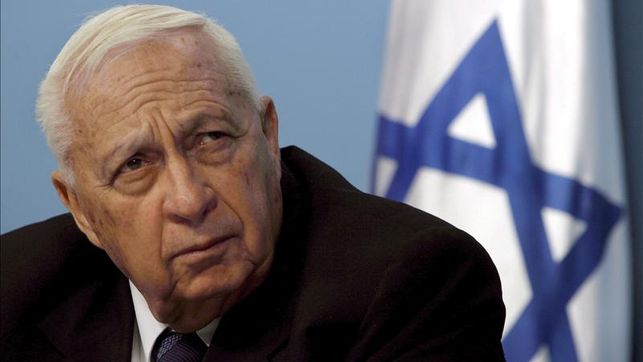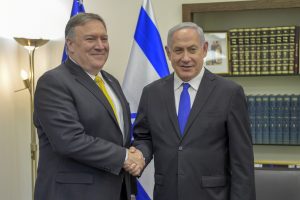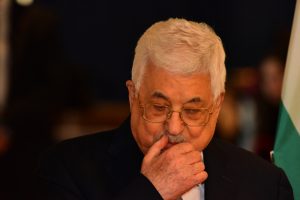by Robert E. Hunter
Ariel Sharon, the former Defense and Prime Minister of Israel, who died last week, was one of the most controversial leaders in Israeli history. I met him several times, including when I was the White House representative on the US negotiating team for the West Bank/Gaza Autonomy talks (1979-1981). I can’t say I knew him well; but well enough to know two things: his fundamental commitment was to Israel’s security as a military man, not as an ideologue, and he was immensely complex.
We all speculate about the “what might have beens” of history, and I am no exception. In fact, I will go far out on a limb and argue that tragedy took from Israel the two Prime Ministers who might have done the most to help it move beyond the decade’s long stasis in its relations with the Palestinians. This was so in major part because both men came out of the military and neither could be considered “soft” on security. Both were seeking to create change in Israeli-Palestinian relations. In November 1995, Yitzhak Rabin was assassinated by an Israeli right-wing fanatic; Ariel Sharon suffered an incapacitating stroke in January 2006, 4 months after Israel completed its Sharon-inspired withdrawal from Gaza. The work of both men in trying to build peace with security for Israel was thus cut off in mid-flight.
Let us consider Gaza. Israel’s withdrawal left a political vacuum. But it is not at all obvious that this vacuum had to be filled by Hamas, the movement that then and since refused to recognize Israel’s right to exist and to seek compromises to bring about some reasonable relationship with the Jewish state — not to say that Israel was prepared to reciprocate had there been such a Hamas initiative, much less to take the initiative itself.
In January 2006, at the annual gathering of the West’s leading defense personalities, in and out of government — the Munich Security Conference — I made a proposal during a session on the Middle East. I suggested that Ariel Sharon’s courage in withdrawing from Gaza be honored by a bold step to try creating there a chance for positive developments, beginning with a massive infusion of aid and investment to provide the people of Gaza with some hope and promise in their lives and, not incidentally, to help the relative moderates under Mahmoud Abbas, then and now President of the Palestinian National Authority, gain political traction in Gaza and against Hamas. I pulled a figure out of the air and proposed a $6 billion plan: $2 billion from the US; $2 billion from the EU; and $2 billion from the Arab states — the last-named, I thought, a challenge to those rich Arabs who have profited politically from keeping the Palestinian issue alive to “put up or shut up.”
I was surprised when my proposal was not simply ignored. Indeed, the chairman of the panel immediately endorsed the idea and said that he had his $2 billion to commit, provided that the other two parties I had named would do likewise. That person was Javier Solana, whose set of titles boiled down to his being in effect the Foreign Minister of the European Union. We were “off to the races.”
Unfortunately, the beginning was also the end. The rich Arab states did not respond. Israel opposed any such aid and investment plan and, not surprisingly, the US Congress thus only responded with what could be called “chump change.” The moment — and the opportunity — was lost; the chance, however slim, was never tested to see whether helping to improve the lives of people in Gaza could have provided political strength to the PNA as opposed to Hamas which, as has often happened with radical groups elsewhere (e.g., Fidel Castro’s “barefoot doctors” in Central America), was acting as the provider of social benefits, food, etc. to the trapped people of Gaza.
Thus it was not surprising that Hamas subsequently won the March 2006 parliamentary elections in Gaza. As I argued at the time, the failure of outsiders even to give Abbas and his people a chance to compete was a mistake that would never have been made by Mayor Richard Daley in Chicago or Karl Rove on the Republican side. Abbas would have had at least what is called, in ward-heeler politics, “walking around money.”
Notably, President George W. Bush at first endorsed the results of the Gaza elections; but a day later changed his pitch to oppose the accession of Hamas to power. Even then, it was arguably not too late. Gaza under Hamas was declared off limits and was effectively blockaded economically — political punishment, but, as so often in the imposition of sanctions, a political gift to Hamas. It would face no challenge to its rule, especially in deciding how what meager economic benefits came to Gaza would be distributed. And the rest is history.
WWSHD? That is, “What would Sharon have done?” We can’t know, any more than we can know what Rabin would have done, or have been able to do — though we do know the inclinations of both men at the moments in time when they were each struck down. Nor can we know whether, had Sharon followed through on his decision to withdraw from Gaza with the approach I proposed in January 2006, there would have been an adequate response from non-radical Palestinians; nor whether, had my proposal (or others like it) been followed, Hamas would have been weakened sufficiently to keep it from power.
But it all does make one think; especially to think about yet another missed opportunity — however “untested and untestable in retrospect” — in Arab-Israeli relations, missed opportunities by both sides, with which the history of that conflict has been littered.






Normally, I enjoy reading Ambassador Hunter’s articles as they are based on a great deal of experience, knowledge and insight. However, I am afraid that in the case of Sharon’s withdrawal from Gaza and what he might have done had he lived longer I am not prepared to speculate about any major change in his behavior, because Sharon’s record in office from the beginning to the end shows him as a man dedicated to violence and unilateralism. From his massacre of civilians in Qibya in 1953, to pushing for expansion of Israeli colonies in Palestinian territory in the late 1970s, to his strategy of surrounding Jerusalem with new Israeli settlements as a way of permanently annexing it, to his invasion of Lebanon in 1982 resulting in the death of some 20,000 Lebanese and Palestinian civilians, followed by the massacre of between 800-2,000 Palestinian men, women and children at Sabra and Shatila camps, his opposition to Camp David talks and his provocative visit to Temple Mount or Haram al-Sharif as known by the Muslims with 1,000 police and security forces that resulted in the Second Intifada, the so-called “Operation Defensive Shield” in March 2002 when the IDF was ordered to reoccupy Palestinian cities on the West Bank which the Oslo II agreement had placed under the control of Palestinian Authority, to his pleading to President George W. Bush to attack Iraq followed by Iran, etc. all show that he was not a man of peace, despite the title bestowed on him by President Bush.
Ariel Sharon’s decision in 2005 to unilaterally withdraw the Israeli settlers from the Gaza Strip is described by some as a mark of his commitment to peace, but his so-called ‘disengagement’ from Gaza was a calculated act to get 8,000 Israeli settlers that were kept in Gaza at huge cost to the Israeli army and send them to the occupied territories in the West Bank together with many more illegal settlers. After the elections for the Palestinian Legislative Council that was held on 25 January 2006 with a decisive victory for Hamas, 20 Hamas MPs and eight ministers were arrested by Israel. Gaza was never given autonomy and the unilateral withdrawal was followed by attacks on Gaza including Operation Cast Lead and the siege of Gaza that still continues.
Interesting post, but to what end? Considering the history of Gaza since the Israelis pulled out, especially fast forwarding to today, the conditions on the ground being despicable. Yet the World stands by as Israel copies every other occupier of another land[s], subjecting the people to humiliating conditions, while at the same time decrying anyone who criticizes the actions, reminding the world of what happened 60 years ago. Even if peace came tomorrow, there would still be that segment of Israeli society that hates, regardless of which ethnicity it is.
Mr Hunter’s remarks, regarding Sharon’s death as a ‘tragedy’ and that “his fundamental commitment was to Israel’s security as a military man”, illustrate not only Sharon’s ruthless character but the American self deluded attempt to pass an impartial judgement.
The triangle of ‘military man’, ‘commitment’ and ‘Israel’s security’, given the history of the conflict speak for themselves: of the suffering and death of uncountable Palestinian families whose only crime had been to defend their homeland and integrity in the face of the Zionist onslaught wholly backed by the very pragmatic American Administrations/politicians who regard themselves as self-appointed peacemakers and Judges of the Middle East.
Mr Hunter’s view is precisely shared by Tzipi Livni (Israel’s justice minister/ex foreign minister) to whom Sharon was ‘a father who made us feel secure’; and to Shimon Peres (Israel’s ex-president), Sharon “was one of Israel’s great protectors”.
Such tributes paid to a politician who according to the Human Rights Watch should have been brought to the International Court of Justice for his war crimes do not astonish us given Livni’s performance and heartless support for Israel’s military attacks on civilians in 2006 in Lebanon and 2008 in Gaza. Calling a mass murderer a saviour/‘great protector’ and the continual concern with being ‘secure’ – symptom of the lasting post Holocaust paranoia again signify the extent of the ‘Paranoia’ that Zionist politicians and a great number of Israeli citizens still suffer from – politicians who armed to the teeth with the sophisticated American military war machines and their own nuclear war heads still desperately cry for ‘protection’ and even if one day they murder millions they will still regard their crime as ‘protecting’ their race. Such remarks do not surprise us, nor do Livni’s position as ‘justice’ minister; Israel’s law professors often come from the military – Livni was banned from entering UK in 2009, until the Zionist Lobby in Britain not only made it possible for her and other Israel’s military ‘war criminals’ to be smuggled in and out of Britain but even the lobby forced the British government to ‘change’ its laws so that there would be no legal barrier for these alleged ‘war criminals’ to enter Britain! To see Mr Hunter sharing the same view as Livni’s is alarming.
The most alarming fact however, given the American Zionists’ impatience to attack Iran, is the world community’s reluctance to seriously study the Israeli military and political leaders as groups of disturbed paranoid patients who will eventually unleash violence as they did in 2006 on Lebanon in a desperate paranoiac mode to ‘protect’ their ‘security’.
What a self-revealing article: after so many academic studies and researched articles and factual reports on Sharon’s crimes published worldwide there is not a word of condemnation in Mr Hunter’s article, not even a hint at Sharon’s crimes, given the fact that in America several lawyers would be appointed and lots of money spent and hours of court proceedings follow in order to pin down and convict a murderer but ironically the same country never ever uses the word ‘murder’ or ‘crime’ when its own politicians or their Zionist allies outside the US commit mass murder. Mr Hunter’s articles continue to be enlightening and self-revealing as an ‘American’ politician involved in the Middle East.